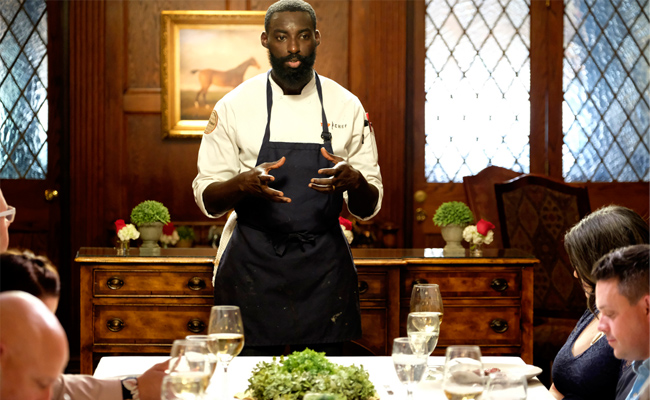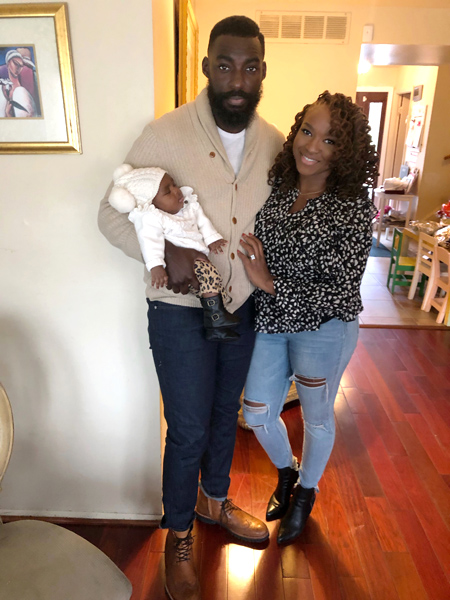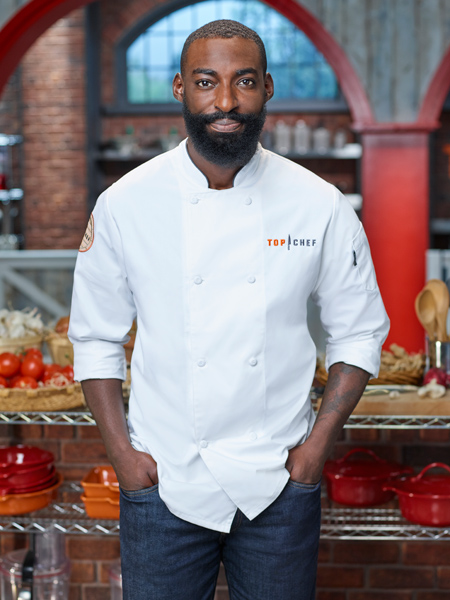
My initial impression of chef Eric Adjepong on this season of Top Chef was that he seemed like the popular kid, the chef most likely to be voted student body president. That initial charm can wear off pretty easily, but Chef Eric’s still smiling and winning, just one episode and a winning vote away from being named this season’s Top Chef.
The Bronx-bred 31-year-old, who co-owns a pop-up and catering company in DC with his wife (he was also a finalist for People’s “sexiest chef alive” in 2018), has revealed multitudes in his time on the show. In addition to trying to introduce Ghanaian dishes every chance he gets, during the bullion challenge in episode 10, Adjepong shared, “I actually wrote my thesis about the use of bullion cubes in West African cooking.”
It was, to my knowledge, the first time “actually my thesis was about this” has ever been dropped on Top Chef. We tend to think of chefs as people who start working in kitchens in their teens, run themselves ragged working 70 hour weeks, and freak out if they’re not running their own kitchens by their late 20s. But Adjepong took a few years off to move to London and get his masters degree in the middle of his career. Now he’s back, competing on Top Chef, where he’s reached the final four, proving there’s no one blueprint for success.
I wondered about that thesis, and about what else Chef Eric might be hiding. So I spoke to him by phone this past week to get some answers ahead of tonight’s episode.
—
Thanks for talking to me.
Yeah man, I appreciate the time. It’s good to put the voice behind the name as well, so I’m looking forward to it.
I was just watching the most recent episode just now.
What did you think?
Well, you started talking back at the judges, and I was like, “Oh no, what is he doing?” But then I was also like, “He’s kind of right, that is a really weird criticism of a curry.” But then I was like, “Wait, he’s not gonna argue with the Indian lady about curry, is he?”
Right, right. So it’s tough, man, because you want to be respectable, but I’m like, I know what I’m talking about as well. I don’t know. It was interesting, but it’s crazy to think that, especially Padma man, her palate is crazy, right?
It’s so well-versed. So on her side of the world, and this is how crazy food works, her side of the world, this is how food is presented, versus my side of the world, and we essentially call it the same thing, we call it “curry.” So it’s almost philosophical at that point.

Did you go in the show with rules in your head, or notes about things you’d seen people getting kicked off for?
No, I didn’t. I went in really with the mindset of relinquishing control to a certain point. You know what I mean? I’m putting myself in the abyss. I don’t know what the f is going on, I’m putting myself in a really crazy situation. So the one thing you can control is your mind and your actions towards whatever’s being tossed at you. If the first thing you think of when you hear this crazy-ass challenge is how fun this is gonna be, then you’re gonna have a great time. You’re gonna have a better output than, “Holy shit, I’ve never worked with this product before,” or whatever the case is.
I really just tried to focus on positive. That’s literally the whole thing, my mantra, throughout the whole time.
So what’s the trade-off, work-wise, in terms of the time you have to take off to be on the show, versus what you potentially get out of it career-wise?
Still pending. …Yeah. It takes its stages. It’s kind of like a rollercoaster going up, and then there’s that climax, and then it drops. And I feel like I reached that point, that last click, or the couple last clicks right before that drop. So it’s still ongoing, but I tell you man, it’s a lot of stuff that you have to let go of. And not just me, everybody. Whether you’re working in a restaurant, or you have your own business, family, there’s so much shit that you’re stopping. And the world’s not stopping for you either. There’s no pause button.
So you’ve been trying to introduce us to Ghanaian food this season. What’s a good gateway Ghanaian dish for people that don’t know it so well?
Jollof rice, straight up. I always toss it out as the paella of West Africa, just because it’s that important to the people. It’s a tomato-based kind of rice, but it has so much depth and flavor. There’s red onions, there’s peppers, there’s so much curry, there’s nutmeg, there’s … And depending on where you go, what country in the region of West Africa you go, you have a different kind of variation of it. So yeah, jollof rice is definitely something that … It’s easy to make as well, and you can get ingredients that are readily available and make it happen for yourself. That’s a good start. I think that sauce, that base itself for the sauce that you create the rice from is like a gateway to other sauces as well. Kind of like a bechemel and a mornay, you know what I mean? So it works like that.
Right on. It seems like one of the aspects of just the American experience, in general, is maybe growing up with kind of an immigrant slang sort of Spanglish version of the dishes that your grandparents grew up with. Did you have that at all with Ghanaian cuisine? Do you find a difference between the things that a Ghanaian-American eats here, versus the stuff that you would eat when you would go back?
That’s a really dope question. I think just from sheer proximity, yes, because you can’t necessarily eat everything that’s being grown in Ghana in the Bronx. And vice-versa. But you adapt. My folks came to New York City in the late 80s and had me immediately. So the food that I grew up eating, they didn’t really have time to really adjust to the American palate. I was still eating … They were finding ways to get cassava and yam and plantains, and fufu, and everything through their community in the Bronx. And that’s how I grew up eating. So I almost had that kind of palate really early on in my back pocket, and then when I went on to go to school and learn more and become classically trained, that’s when I was able to drop those notes eclectically into, I guess, modern American food and foreign food that people typically would have but never had it, and that type of stuff.
When people say they modernize a certain style, what do they usually mean by that? And is there a way to do that to where it’s still … Where it doesn’t become, I don’t know, like a fusion I guess, or it still pays respect to what it’s modernizing?
I can speak for what I say as modernizing, I don’t know about everybody else. But I think for me, it’s taking traditional techniques that you would with someone who’s maybe 90-years-old, if they’re cooking in Ghana, and adapting that to something that is commonly known now, especially in the Western World. So a really cool example is Waakye. Waakye is one of, I call it the old-school rice and beans. And I’ve taken that, rather than just putting jasmine rice. And Waakye is actually made from dried sorghum leaves that bleed out this really beautiful purple magenta kind of color. So you make the rice out of that, and you add black-eyed peas to it.
So using that same technique, I then took that, and rather than using rice, jasmine rice, I took wheat berries, that’s a barley, that’s a quinoa… A mix of different grains, different textures, and applied that same old-school technique to something that’s a little bit more modern and updated, and deconstructed it a little bit. So you’re still getting that same essence, you’re still getting that same flavor, but it looks completely different.
You’re applying it to maybe a wider variety of grains that you have available around?
Yeah, absolutely, but more so ones that are also familiar to folks out here. You know what I mean? To the Western World, to the American palate. So it’s kind of like a nice little bridge.
You brought up your thesis at one of the episodes. I was wondering if you could … I don’t know if you can cliff notes it for me, but I was wondering if you could explain it a little more maybe?
Yeah, man. So, I went to Ghana when I was studying in London at the University of Westminster. And I was curious to know if there was any sort of correlation between the Maggi bouillon cubes, the Nestle product, and the rise of noncommunicable diseases, such as heart disease, or hypertension, or things like that. Seeing the popularity of the Maggi cube in West Africa, they came in… And I’m sorry, it’s a really long story. But they came into the late 80s and really blew up and branded themselves. Along with that though, industrialization happened, and things became more rapid, people working in the cities, so on and so forth.
So people are needing to cook faster, and cook quicker. They don’t have time to cook at home. So my theory was, are they using Maggi cubes in replacements to old techniques, and is that the cause, or is that helping, or hurting rather, the public health spectrum and the rise of everything else? So I went to two different cities, Kumasi and Accra. I did a food frequency questionnaire, and I asked a hundred people between the ages of 90 and 12 I believe, “How did you cook, when did you notice your family started changing or using Maggi cubes, such as …” And came to realize that people around maybe the mid 80s, late 90s, started really changing the way they cooked, and started using more Maggi cubes. But yeah, long story.
That’s a good story. So what were you studying at that stage?
International public health and nutrition.
And then, how far did you… did you finish your degree with that?
Yes, I graduated with a master’s at the University of Westminster.

And at what point did you decide that you wanted to be a chef?
This is well after, this is my master’s degree. Beforehand I had gone to Johnson & Wales University. I studied culinary arts. I was working in restaurants beforehand. I worked in two different Michelin restaurants before I got to do my master’s. So I was in the industry. I was cooking. But I kind of paused and decided to… You know better, you do better, so.
Right, what made you want to do that?
It was a crazy, crazy kind of fork in the road at the time. I had staged for Bryan Voltaggio at Volt, and I was offered a job. But then I had a cousin in London who was like, “Hey, how crazy would it be if you just came out here and just studied, and just continued your education?” I told her that I was interested in maybe doing a master’s degree. So it was really at a pivotal point where I wanted to decide, should I move to Maryland from New York, and work for someone that I regard highly, or go on and do something that I think would be self-fulfilling? And I did the latter. And it’s cool, because it all kind of came back during that episode when Bryan was out for my mentor episode.
Were you working in kitchens at all while you were getting your masters?
No. I staged at one spot. It was a really small place in Westminster. And it was maybe for a few days, and nothing serious. I was out there for my studies. I was pretty much a student when I went out there. And then when I flew to Ghana, I pretty much stayed out there for three weeks, and did the project. So it was really just a project, and a corny type thing, like finding yourself. But it was dope man, it was really cool for me to just be out there. You learn a lot more outside than inside the school.
Doing something else, does that help your career choice, make it feel more like it’s something you’re doing because you want to, and not just something that you’ve committed to and you have to ride out kind of thing?
I do this because I’m obsessed. I love knowledge. I like to learn. And for me it’s like a rabbit hole. So if I’m equipped with the knowledge of cooking, then I should be equipped with the knowledge of understanding how food works, and our bodies, and how that works on a global scale, or even a smaller scale, a community scale, a block, a neighborhood, a state, a country, so on and so forth. I went in with the full intention to really master, as much as I can, food.
Going back to the show… So 30 minutes seems like a really short time to try and butcher and batter and fry a chicken. Am I wrong?
It was nuts, man. I specifically remember the fryers being way too hot. So yeah, in addition to the timing… Quickfires are kind of meant to be a scramble anyway, right? But, you’re really trying to put a square peg in a round hole, because certain things just can’t be done in a certain amount of time. But you just gotta do your best and make it happen. So again, my thought was just, “All right, cool.” I joke with Justin all the time, if a challenge said you needed to butcher a pig with only a paring knife, then I’m prepared to do that. It is what it is, that’s what we’re here to do. I just went for it.
Do you think you got a feel for the judges’ individual tastes? Like, if you were cooking for just Tom or just Padma or just Graham, what would you do differently?
I wrote that during the course of the season in my notebook. I paid attention to their comments and what I thought their palates would be. And I think so, yeah. So for Padma, it’s delicate, very light flavors, bold flavors in spice, but a lot of finesse. Tom is just, he’s a savant. He knows more… He’s probably forgotten more techniques than we know. He’s looking for technical, and he’s looking for flavor, but he’s also looking for thoughtfulness on a plate. The same thing with Graham. So I think everyone has a different approach, but they’re all kind of getting to the same destination.
Who do you think your funniest competitor was?
Funniest? Oh man. Who was the funniest … Shit. Eddie Money. Nini is hilarious. Pablo’s a joke. That’s my dude, man. And Justin… Yeah. Sara’s a riot too, Sara’s hilarious. What am I forgetting… Sara’s probably top tier, yeah. Sara’s pretty stupid.
Who do you think had the weirdest living habits, having had to live with everybody?
Geez. I was not in the room with Brandon and Brian, but I’ve heard some interesting morning rituals as far as the pompadours are concerned. So I think they probably take that.
What do you think is the thing that affects the show the most, that we don’t see on camera?
Timing. I think timing is crucial. Timing’s always crucial in the business anyway, restaurant service, period. But I don’t think people understand the severity of the pressure, the volume, in which you need to get certain things done in a certain amount of time with certain challenges. They try to capture it, but that clock moves, man. It’s not your friend at all.
So what was your first restaurant experience working?
Oh man. I worked at a spot in Providence, Rhode Island, for a chef called Derek Wagner, in a spot called Nick’s on Broadway. And he was not only the first chef I worked for, but one that I still today try to pattern my work habits around. The fundamentals I learned there, even with all the education that I got… it’s nothing like that work experience. So yeah, Derek Wagner, Nick’s on Broadway, shout out to Providence.
Tell me about where you grew up in New York, and what special experiences shaped your palate and the seminal food experiences of your childhood?
So, I grew up in the Bronx, New York, for the majority of my life. And if you’ve ever been to the Bronx, it’s one of those boroughs, probably one of the only boroughs in New York where you can get Italian food, Jewish food, Spanish food, African food, Jamaican food, all on the same block. You know what I mean? And it’s so dope, because there’s so much flavor, there’s so much authenticity to the way people cook. So I grew up having very deep flavors, and intricate flavors, all throughout my childhood. I think that definitely shapes the way I approach food now, for sure.
Vince Mancini is on Twitter. You can find more of his reviews here.






